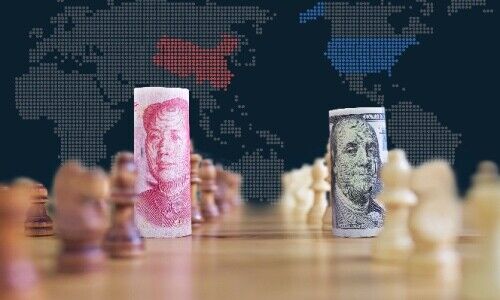At this point last year, a visit by a senior US government official to China would have created a frenzy of geopolitical speculation in the media here in Asia and elsewhere. As Janet Yellen's just-concluded trip shows, that no longer seems to be the case.
If nothing else, the whole thing was very well-choreographed by the US State Department. A good 17 emails were sent directly to the media relating to Secretary of the Treasury Janet Yellen’s visit to China – and the trip is not even over yet.
There was a press gaggle in Alaska on the way there, a roundtable with on-the-ground experts in China as well as bilateral meetings with an assortment of senior mainland government officials, including, importantly, Premier Li Qiang.
Stable Footing
The net result? The key message this year seems to be that the US believes the relationship between the world’s two largest economies is on a «more stable footing» The area of most concern right now? China’s industrial overcapacity.
That is a big comedown from the heady days of 2022 and 2023 when the talk was about the relative merits of the West’s efforts to de-risk, while not necessarily completely de-coupling the two superpowers, as finews.asia observed then.
Similar View
The Chinese government largely seems to be echoing those sentiments, with mainland news agency Xinhua reporting that the relationship between the two countries is «beginning to stabilize».
Still, the story was placed relatively near the bottom of the website and given a single-line headline, unlike Chinese President Xi Jinping’s meeting with the chairman of Vietnam’s National Assembly and the congratulations extended to Malta’s new president, both of which were published far higher, and more prominently, on the page.
Possibly Temporary
Still, this is all getting curiously manageable and should be seen as a sigh of relief for the global banking industry. At the same time, it could all be temporary. Everyone in China may simply be treading water given is an election year in the US.
Moreover, it is a contentious one for many around the world given there is a very realistic chance former president Donald Trump could be re-elected as the latest «NPR/PBS NewsHour/Marist» poll indicates.
Trump 2.0
Some voices in Asia are already speculating about that very possibility, as finews.asia reported Monday when it cited the former Singapore foreign minister’s indication that China would prefer a Trump presidency over current US President Joe Biden.
We can expect to hear a good deal of those kinds of comments over the next few months from both former government officials and senior regional bankers in stating their preferred outcome – as well as the potential consequences of each candidate's re-election.






















